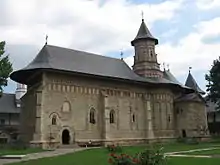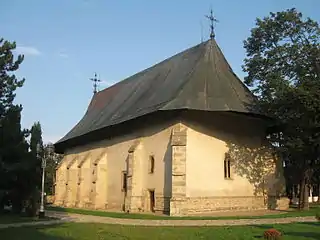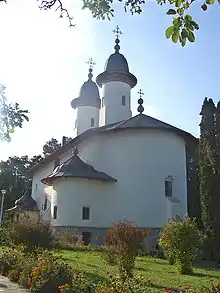Moldovenesc style or Moldavian architectural style is a type of architecture developed in Moldavia during the 14th through 19th centuries.
The period of maximum flowering of this style was in the period of Stephen III of Moldavia. The Moldavian monasteries which belongs to the UNESCO heritage are made in this style.[1] The period in which it developed most is the reign of Stephen the Great (1457-1504).
Gallery
 Putna Monastery in Suceava County
Putna Monastery in Suceava County Neamț Monastery in Neamț County
Neamț Monastery in Neamț County
 Căpriana monastery in Strășeni District, Moldova
Căpriana monastery in Strășeni District, Moldova Bistrița Monastery in Neamț County
Bistrița Monastery in Neamț County St. George Church in Hârlău
St. George Church in Hârlău Stephen III of Moldavia's Tower in Piatra Neamț
Stephen III of Moldavia's Tower in Piatra Neamț Three Hierarchs Monastery in Iași
Three Hierarchs Monastery in Iași Bogdana Monastery in Rădăuți
Bogdana Monastery in Rădăuți Dobrovăț Monastery in Iași County
Dobrovăț Monastery in Iași County Văratec Monastery in Neamț County
Văratec Monastery in Neamț County Galata Monastery in Iași
Galata Monastery in Iași Bell Tower, Popăuți Monastery in Botoșani
Bell Tower, Popăuți Monastery in Botoșani Cetățuia Monastery in Iași
Cetățuia Monastery in Iași Sfânta Paraschiva Cathedral in Roman
Sfânta Paraschiva Cathedral in Roman Socola Monastery in Iași
Socola Monastery in Iași Sihăstria Monastery in Neamț County
Sihăstria Monastery in Neamț County Dragomirna Monastery in Suceava County
Dragomirna Monastery in Suceava County Secu Monastery in Neamț County
Secu Monastery in Neamț County Hadâmbu Monastery in Iași County
Hadâmbu Monastery in Iași County
See also
References
- ↑ IBP USA (3 March 2012). Romania Country Study Guide Volume 1 Strategic Information and Developments. Lulu.com. pp. 69–. ISBN 978-1-4387-7538-8.
External links
Wikimedia Commons has media related to Architecture of Moldova.
This article is issued from Wikipedia. The text is licensed under Creative Commons - Attribution - Sharealike. Additional terms may apply for the media files.